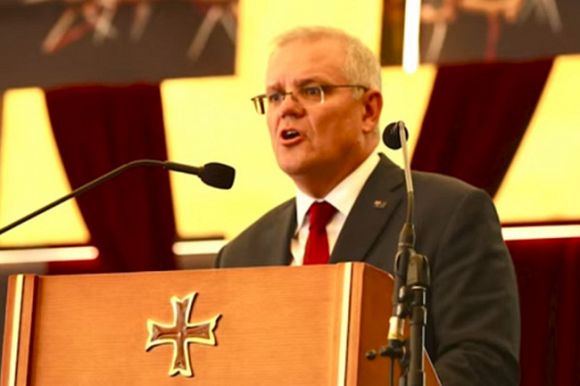A firm including a senior policy adviser to non-secular PM Scott Morrison has recently evaluated the contentious $247-million-dollar National School Chaplaincy Program. Belinda Jones reports.
THE NATIONAL School Chaplaincy Program (NSCP) has long been a contentious issue for Australians, albeit one that has enjoyed the bi-partisan support of both major political parties since its inception in 2006.
The idea originated with Greg Hunt and was supported by Andrew Laming, David Fawcett and Louise Markus, who convinced then-Education Minister Julie Bishop and then-PM John Howard to adopt the controversial scheme.
Bishop said at the time that parents were “looking for choice in the education and values taught to their children”, insinuating that only faith can teach values. Many teachers and parents took offence. Howard thought it was a marvellous idea and committed $90 million. Since then, the Federal Government has invested over a billion dollars in the NSCP, with the most recent tranche of $247 million coming from the Morrison Government.
Kevin Rudd did try to improve the program by introducing non-religious "student welfare workers". Tony Abbott rescinded that decision when he became PM in 2013. Prime Minister Anthony Albanese is reinstating it.
The program hit a huge snag in 2012 and again in 2014.
The High Court found that the Commonwealth Government did not have the jurisdiction to administer the program, determining it:
'… was not supported by the executive power of the Commonwealth... [And the High Court found it to be] unlawful.'
After the High Court decision, the Abbott Government circumvented the ruling by forming agreements with the states and territories to implement the federally funded scheme.
The current agreement with the states and territories is due to expire this year, which was the impetus for the Federal Government contracting dandolopartners to do an evaluation of the NSCP and create a report, which was delivered to the Federal Government last November and released to the public last week.
Dandolopartners identifies as a 'management consulting firm specialising in public policy'. The company has a diverse group of staff, many with previous roles in the very governments that are now the subjects of its "independent" reports.
One of the firm's managers, Tom Antoniazzi, was an adviser to Scott Morrison immediately prior to joining dandolopartners. Antoniazzi’s original 2021 biography (see below) on the dandolopartners website was very explicit about his role as an adviser to Morrison. It has since been revised to omit much of this information, suggesting dandolopartners might see this as a conflict of interest when evaluating decisions by the Morrison Government.

Antoniazzi was working as a senior policy adviser in the Department of Prime Minister and Cabinet (PM&C) when Morrison committed $247 million to the current four-year agreement with the states/territories for the NSCP.
Dandolopartners was contacted for citation information about the authors of the NSCP report. Spokesman and director Joe Connell declared “it’s not our policy to name individual authors”, neither confirming nor denying whether Antoniazzi contributed to the report in question.
In real terms, the NSCP report offers very little guidance to the current Labor Government other than emphasising the need for a much more thorough investigation and overhaul of the chaplaincy program.
The report highlighted significant shortcomings and concerns in the NSCP and identified areas that need reform while simultaneously, in general terms, championing the benefits of the program.
The difficulty in reaching any definitive conclusions was the result of the convoluted way the NSCP program is being delivered as a result of the High Court ruling.
While the Federal Government fully funds the NSCP, it has very little control over the program and to date, has failed to include (or insist states/territories include) the most basic of details that should have been included in the first instance by Howard but weren’t.
Dandolopartners’ recommendations to the Albanese Government include clear definitions of the word "proselytize", a consent mechanism, a framework of roles and responsibilities for chaplains, scope, risk management, a system for complaints, and a code of conduct for chaplains, among other things.
The report suggests the NSCP “manage risk” — effectively, the NSCP has the potential to go pear-shaped at any moment, which could result in litigation for both states/territories and the Federal Government.
The collection of data was also problematic as dandolopartners were given a very short timeframe and received an overwhelming number of submissions in ten days — an indication of the depth of interest in the matter within the broader community.
Not all submissions were weighted equally. Dandolopartners were compelled to manage 'disproportionate response rates' as submissions came from all sectors of society, including ‘non-school based stakeholders’.
Not all schools participate in the NSCP, as the report states:
'... some schools have chosen not to participate, including all public schools in the Australian Capital Territory.'
The report values the uniqueness of the generalised role of chaplains while recognising the inherent risks in such a laissez-faire program. The report also recommends the program’s name be changed because the use of the word "chaplain" was not inclusive of non-Christian religions and also deterred students and parents from participating because of the religious element.
Key trends impacting student well-being were noted as natural disasters and the pandemic. The report also highlighted that NSCP chaplains are not trained to deal with children’s increasing fears about these disasters, the pandemic and climate change. Many students said they did not feel comfortable discussing sensitive matters like gender identity or sexual orientation with chaplains.
Some rural and remote principals complained there weren’t enough chaplains, while chaplains complained that the hours and remuneration were low and their compulsory, but unpaid, professional development had to be done outside of school hours. Both principals and chaplains complained of 'blurred lines of accountability'.
Many students, parents and non-school-based stakeholders complained that the NSCP is not secular and they held strong views on the importance of governments and public schools remaining secular.
Said one parent (or guardian):
'The role is a great idea. Just make it secular.'
The NSCP, in its current form, is untenable and requires a massive overhaul to make it functional, equitable and fit for purpose to meet community needs and manage associated risks before the Federal Government recommits to new agreements with states and territories.
You can follow Belinda Jones on Twitter @belindajones68.
 This work is licensed under a Creative Commons Attribution-NonCommercial-NoDerivs 3.0 Australia License
This work is licensed under a Creative Commons Attribution-NonCommercial-NoDerivs 3.0 Australia License
Support independent journalism Subscribe to IA.














